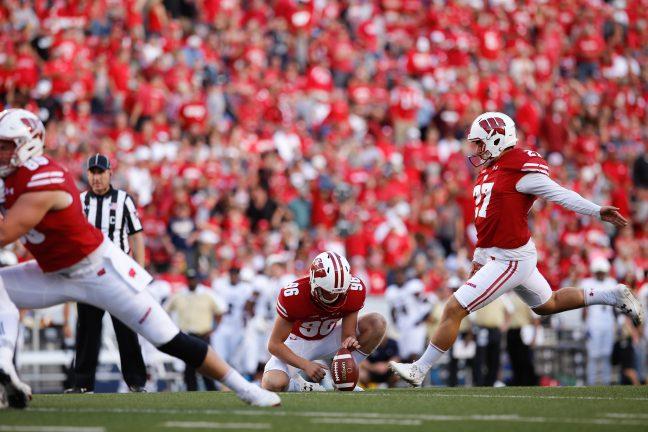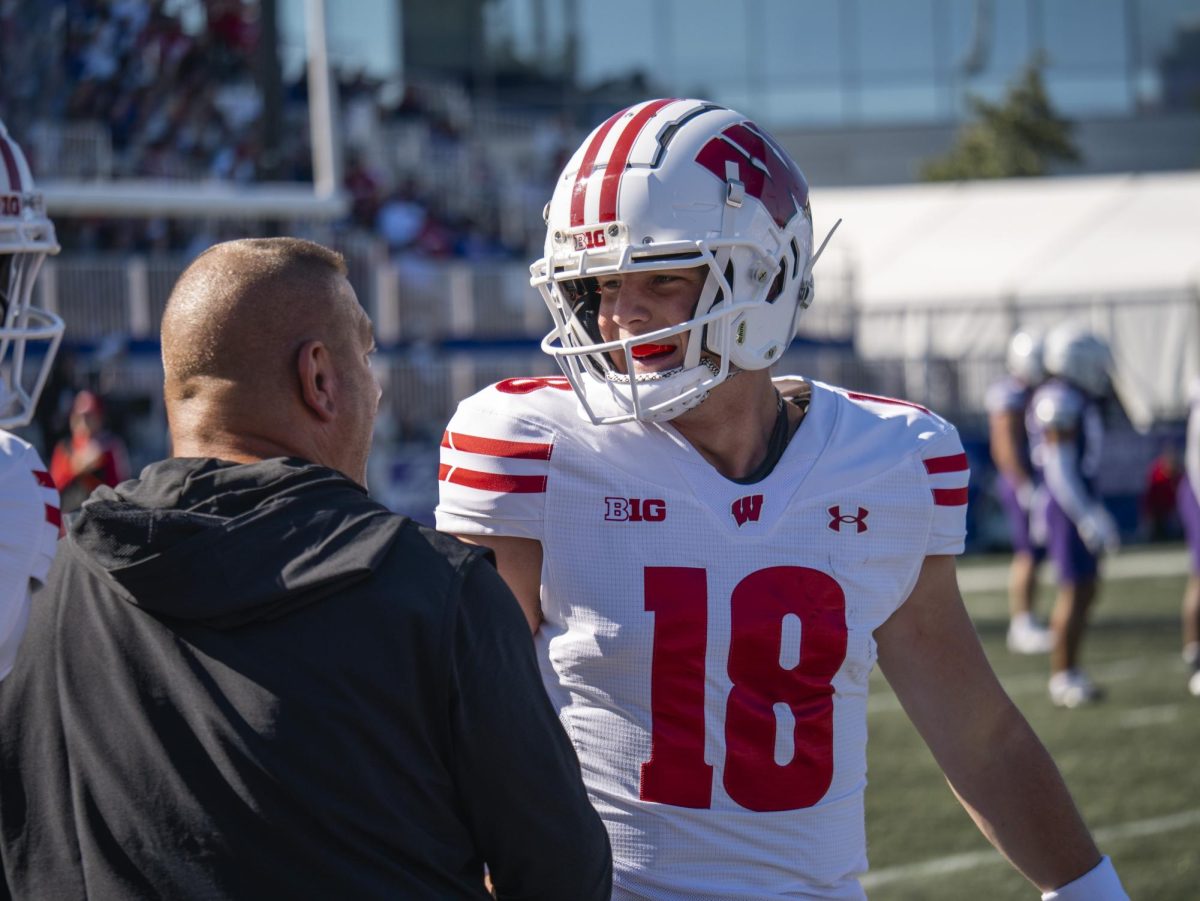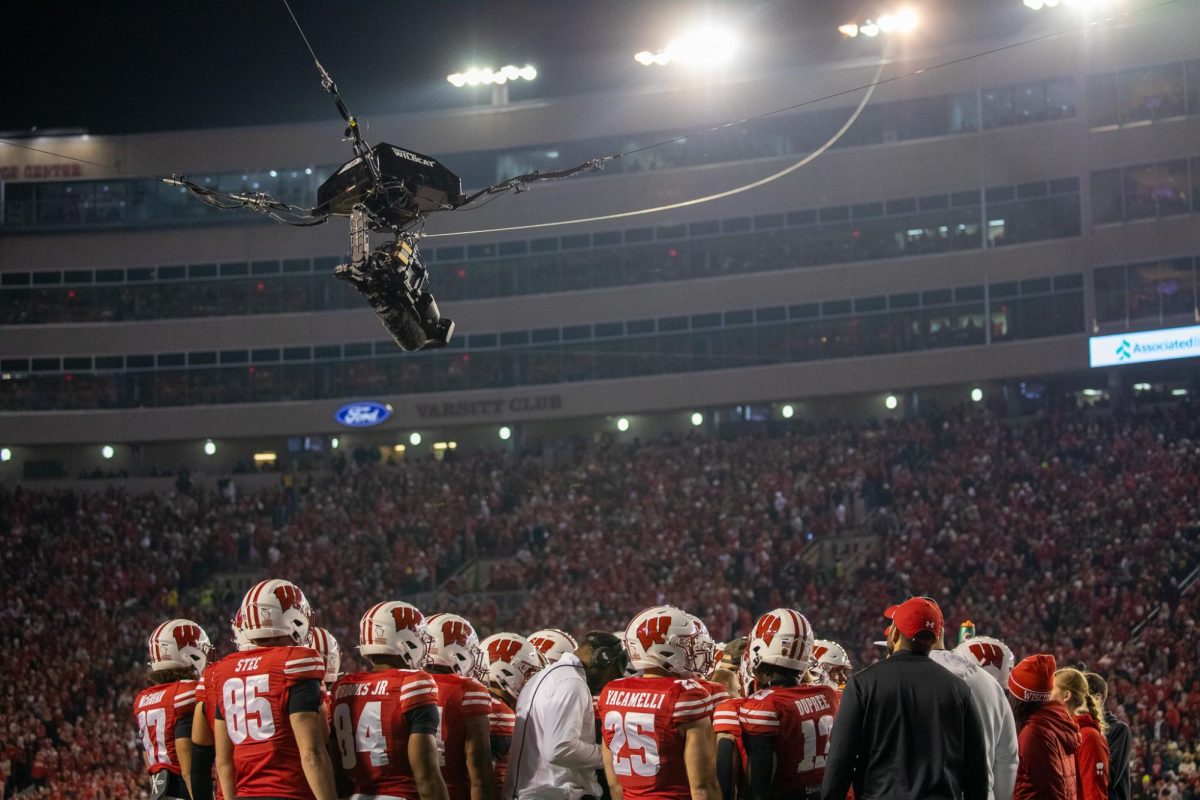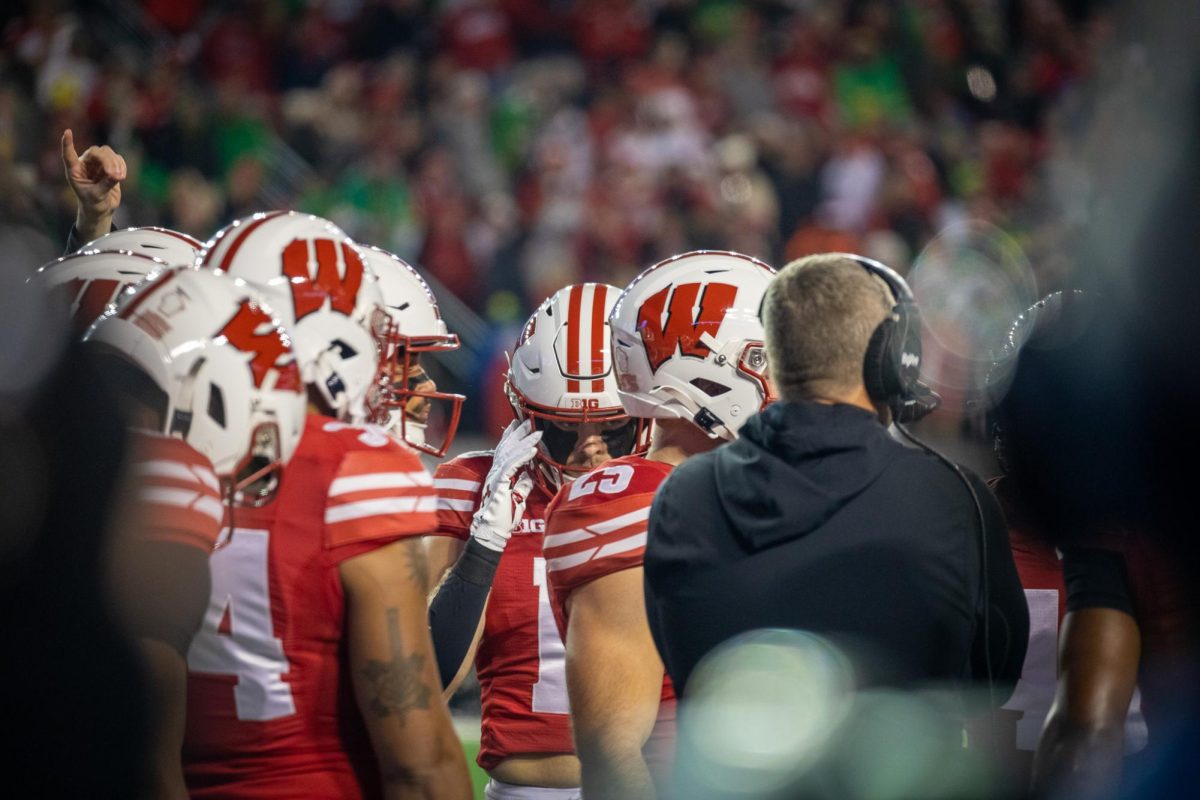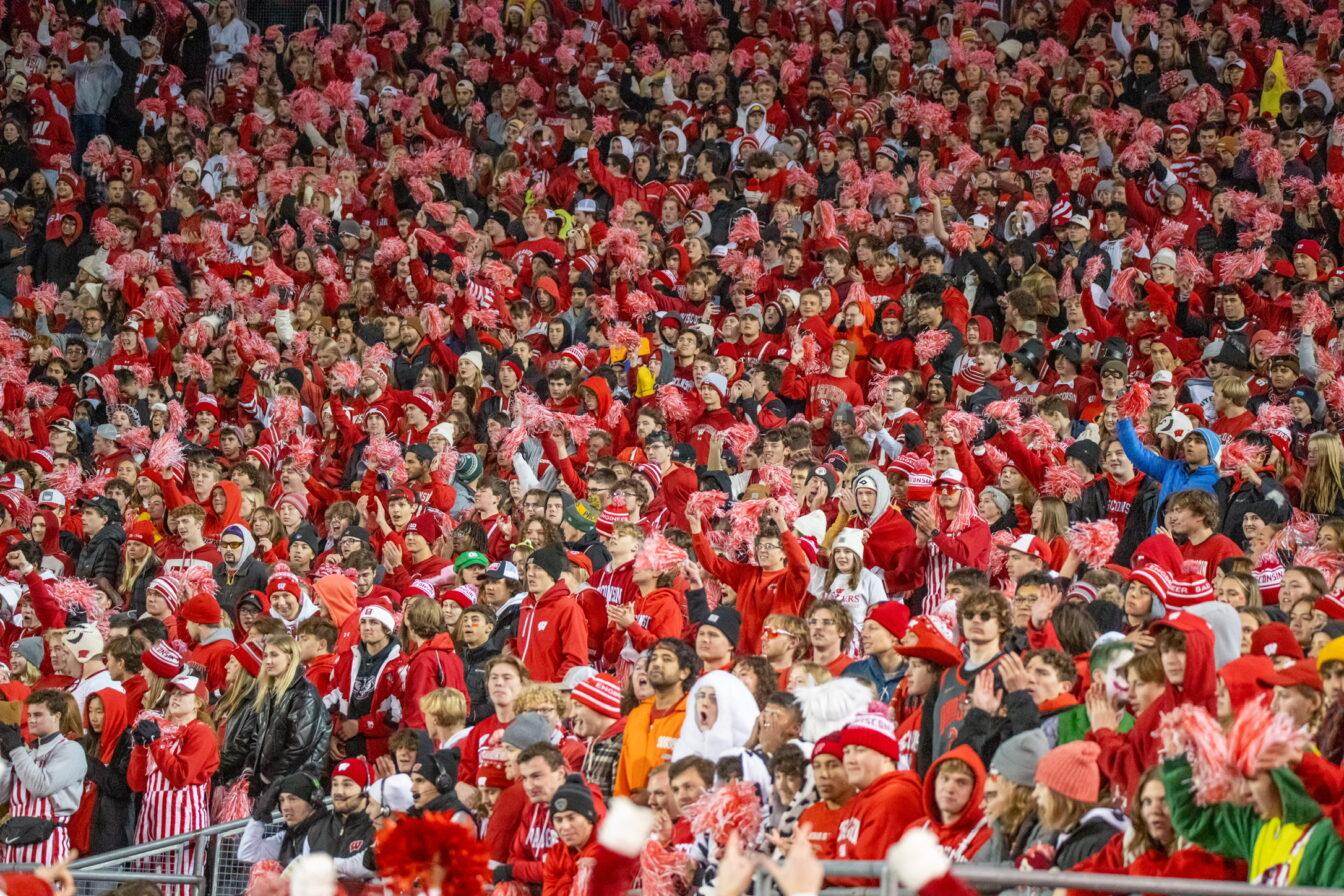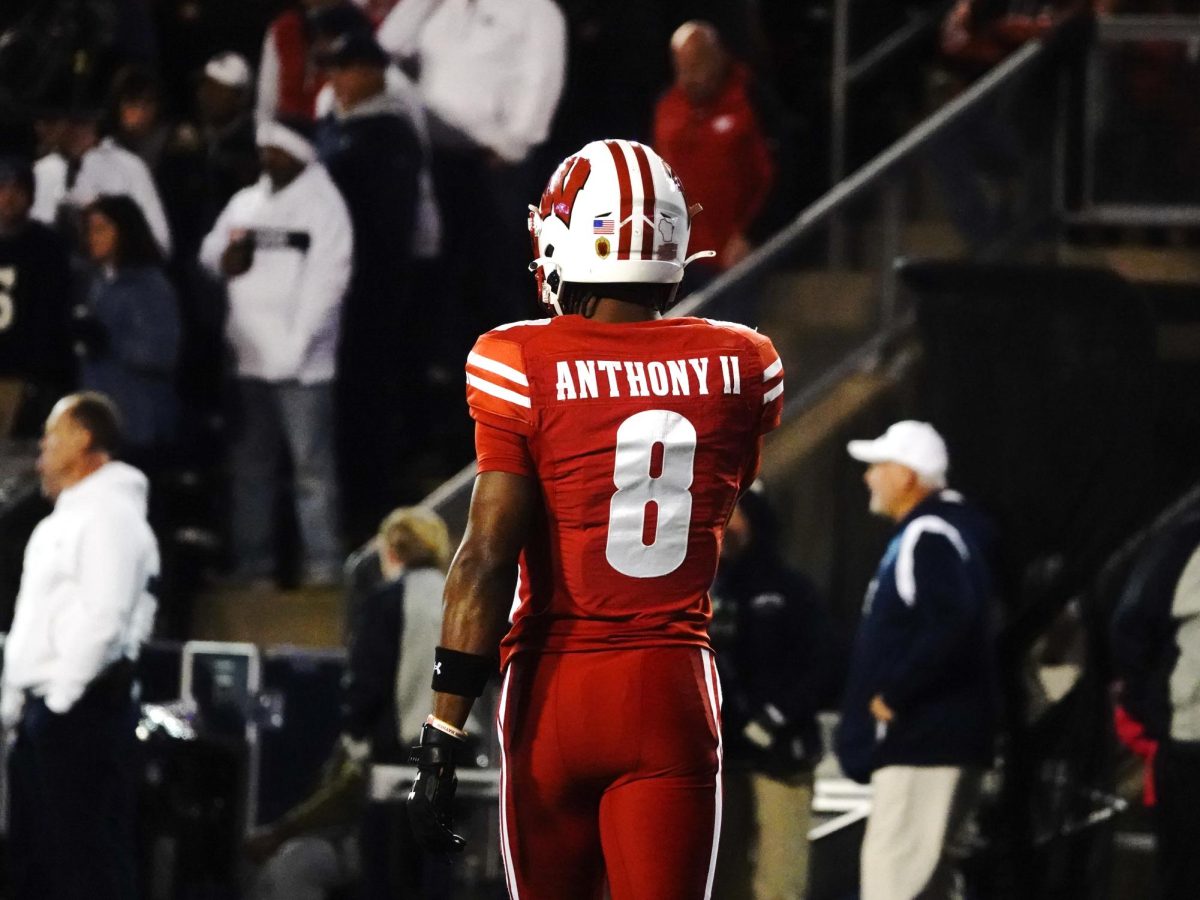It’s 8 a.m. on a Tuesday morning in the McClain Center, and Wisconsin football spring practice is underway.
The defensive line takes shifts bowling over blocking dummies, exploding violently from the three-point stance while their coach demands more effort on every play.
Cornerbacks and safeties line up along the sideline with their backs to midfield. On their coach’s signal, they sprint backwards, turning their shoulders to the left or right after a few steps. Any lapse in exertion in snuffed out without question — you either practice hard or don’t play at all.
Wide receivers and quarterbacks are settled in their own corner of the field. The quarterbacks hold the ball in front of them as if to mimic a center, jolting it to their chest as they back-pedal and deliver strong throw after strong throw to receivers who run their routes with as much intensity as an in-game scenario.
Out of bounds and brushed to the side are the kickers. One stands several meters behind a fellow teammate who’s ready to snap the ball to the waiting kicker. The ball is snapped, spinning through the air into outstretched hands. The kicker rotates the ball, seam-side up, dropping one hand in preparation for the eventual kick. He takes two steps forward, raising the hand no longer gripping the ball for balance, and drops it towards his kicking foot.
But his legs stays dormant. Unlike the rest of the team during practice, it appears to the untrained eye that the small squad of kickers hone their ability to prepare for a kick, but never actually let loose.
It’s easy then, by that measure, for the average football fan to make assumptions about the difficulty of a kicker’s job or to assert that the physical taxation or preparation they undergo is significantly less than the average position player. It’s almost as though two independent groups of athletes exist on the same team. There are the football players, and there are the kickers.
Football: Jonathan Taylor, offensive line highlight Big Ten Award recipients from Wisconsin
But what other position is characterized by scrutiny in the same way a kicker is? If a kicker performs well, they seem to be doing the bare minimum.
A field goal sails through the uprights. “Great,” a fan might think. “Not as good as a touchdown, but we’ll take it.”
They seem to be the butt of every football-related joke. “You took a kicker in what round?” a fantasy football team owner may ask.
Even the most consistent kickers in football history, the Stephen Gostkowski’s and Adam Vinatieri’s of the world, are not celebrated players in the eyes of fans — they’re functional players. In game-winning scenarios, their contribution is recognized, but only for a moment.
But in scenarios when the game is on the line and a kicker’s attempt sails wide, they become public enemy number one. No other position is so lopsided in the criticism it garners. If you’re an exceptional kicker, you’re meeting expectations. If you miss one kick, you’re bombarded with incomparably vile and biting remarks.
And the kickers at Wisconsin are aware of that pressure, which is why they say their preparation is no less demanding than the rest of the team. Rafael Gaglianone, Wisconsin’s place kicker and school record holder for career field goals, knows his position is respected within the locker room.
“When it comes time for a game it’s not like [teammates are saying], ‘Oh that guy only shows up on Saturdays,’” Gaglianone said. “We’re doing everything [the rest of the team] is doing, we’re in the weight room when they’re in the weight room.”
Earning your teammates’ respect makes the existence of a publically overlooked position that much easier, but the culture around kickers appears to be changing, and understanding their job as told by them is a valuable first step to moving away from ridicule.
Fullback U: Why football’s forgotten position still reigns supreme in Madison
Internal Reputation
Apart from Gaglianone, punter Connor Allen and backup punter P.J. Rosowski control the remainder of kicking duties for the Badger special teams.
Practice for the kickers does not begin with the rest of the team, Rosowski said. The group generally punts, kicks and stretches in a separate facility, only rejoining the team at the close of practice to participate in kick return drills for the special teams unit.
The metaphorical line between the “team” and the “kickers” would seem to be strengthened by this phenomenon — players who practice elsewhere would naturally feel far-removed from their teammates. But a minor relocation during practice doesn’t equate to being othered on this football team.
“Even though we’re out there for a couple plays a game we’re working just as hard as everybody else,” Allen said.
There’s no spectrum of what it means to be a teammate for Wisconsin football, Gaglianone said. As long as you’re devoted and authentic, the rest falls into place.
“Just be yourself, you don’t have to try and fit into a preconceived notion or the idea of what it’s like to be a football player,” Gaglianone said. “If you’re yourself and you’re truthful to what your values are people will appreciate that.”
More than just a show of realness, these players are genuinely interested in broadening their football horizons beyond the sphere of kicking. Rosowski, who shares an apartment with linebacker Ryan Connelly, said the two often discuss the opposing offensive schemes Connelly studies during the week, as well as what the linebacking corps has been focusing on recently. Rosowski said the more he knows, the better a teammate he’s able to be.
“It’s good to try and get yourself into the game rather than separate yourself as a kicker,” Rosowski said.
Men’s basketball: Late game threes give Badgers victory in Big Ten opener over No. 14 Hawkeyes
While the collective identity of the kickers isn’t separate from the team, they still spend an exorbitant amount of time together, and their competitive nature is hard to contain.
“We’ll compete on just about anything,” Gaglianone said. “At camp we had a lot of time between practice and meetings so we’d go to the ping pong table, pool, whatever it is we’ll compete.”
Allen said sometimes light-hearted competition and practice can overlap. “Ultimate specialist” is one such game, combining every aspect of their position. The kickers starts on the goal line, each snapping the ball as far as they can. Wherever their respective snaps stop rolling, they punt. After the punt comes to a halt, each player must take a field goal. Allen said punter Anthony Lotti and place kicker Zach Hintze are forces to be reckoned with.
But the essence of their dynamic can be reduced to fundamentals. Each kicker emphasized how central criticism and advice are to their stints in practice. If a player recognizes a fault in another’s motion, they have no fear to point it out. Their dedication to preparation is no different than another position player.
“We’re just like everyone else … we can be a loose group but that doesn’t mean we don’t work hard,” Gaglianone said. “If we’re dancing and having fun it’s because we did a good job and prepared well.”
Football: Minnesota takes Paul Bunyan’s Axe on Badgers’ home turf in 37–15 loss
A Shifting Perspective
While the sport may never see a day when a kicker is revered in the same way as a quarterback, their reputation among casual football fans has seen a relative boost. Thanks to personalities like Los Angeles Rams punter Johnny Hekker and former Denver Broncos punter Marquette King, both of whom have combined exceptional kicking with bright personalities, punters and kickers were granted their moment in the spotlight, albeit briefly.
Hekker, in a video with Dude Perfect, the trick-shooting YouTube sensation, wore a shirt reminding viewers “punters are people too.” King made it a habit to be as quotable as possible, delivering memorable one-liners like, “Nobody’s better than me, nobody looks better than me, and it’s whatever.”
While these pros made it a point to stand out from the crowd, much to the delight of football fans nationwide, Rosowski said there is more to standing out than being outspoken.
“Kickers and punters are definitely becoming more athletic, there are guys who take better care of their bodies,” Rosowski said. “They do all the little things right rather than, before, they used to just be guys that had strong legs.”
That training regiment, like the rest of the team, is devoted solely to self improvement, and team improvement by extension. That process, as told by Rosowski, is lost on the majority of football fans. Since the portion of the game is so technique drive, and approaches to executing a kick don’t vary stylistically, that appreciation can be harder to attain.
The Trice is Right: Point guard’s return fuels Badgers hot start
“Everything that goes into [kicking] is so precise that when you do it well, it’s not as though it’s a miracle,” Rosowski said. “But it takes so much repetition and so much practice that people don’t understand how much goes into it.”
Yet in the face of such a high-pressure position, and one where failure is treated far more aggressively than success, there are those still eager to land a kicking job. Rosowski said he’s consistently in contact with young athletes from his community and encourages them to make football their athletic priority.
“I think it’s a great transition,” he said.
Among kickers, kicking is a celebrated tradition. It’s a position that affords instant gratification for a job well done, even if only within the confines of their team. Wisconsin kickers are proud, skillful, devoted and eager to foster the next generation of their position.
“Dream big,” Allen said to the hypothetical next generation. “Don’t let those dreams go away, you never know what’s going to happen.”


